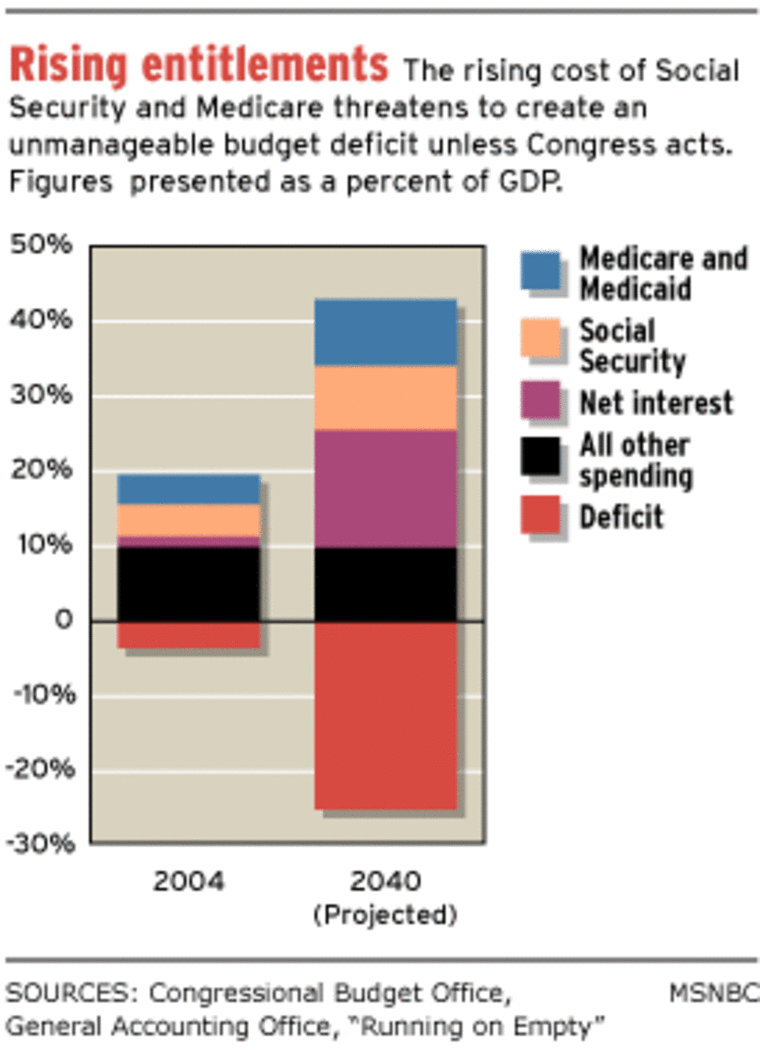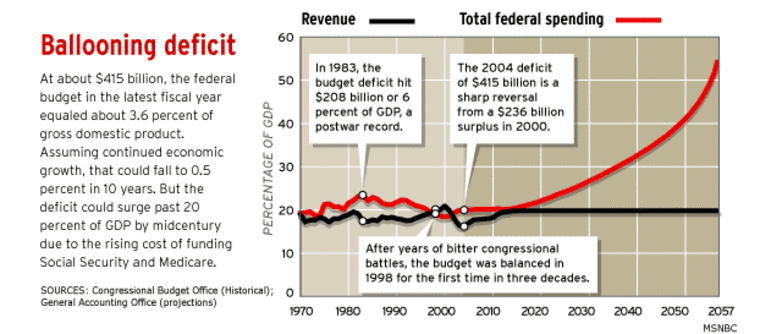The final presidential debate Wednesday will focus largely on economic issues, but don’t expect the candidates to delve too deeply into their plans for keeping the federal budget deficit from ballooning out of control.
Both President Bush and Sen. John Kerry have been conspicuously quiet on how they would attack structural and demographic problems that could lead to unmanageable deficits, soaring interest rates and potentially chaotic financial markets.
The Concord Coalition, a non-partisan group that promotes fiscal responsibility, gives both candidates a failing grade on their approach to the daunting budgetary realities. “The bottom line is that neither candidate has produced a credible set of numbers to back up his deficit-reduction rhetoric,” the group said in a report issued last week.
The report offers a nod to Kerry for his promises to restore pay-as-you-go funding for new initiatives and to scale back proposals that threaten to bust the budget. Nevertheless Kerry’s “seemingly responsible approach is undercut … by the sheer magnitude of the new initiatives he has promised and by the vagueness of the offsets he has proposed," the report says.
As for President Bush, the coalition argues that he has “refused to calibrate his drive for lower taxes” with the high costs associated with the war on terror and new domestic programs like prescription drug coverage for Medicare. “There is no reason to expect anything different in a second term,” the report says.
It is hardly surprising that the two candidates are steering well clear of the potential tax increases or reduced benefits that might be required to manage budget deficits as the demands of an aging baby boom generation threaten to overwhelm the economy. There is good reason why Social Security is described as the “third rail” of U.S. politics.
“If they did have plans to reduce the benefits of the entitlement programs — which is absolutely critical — they would be pilloried by the other side,” said Concord Coalition President Pete Peterson, who was commerce secretary in the Nixon administration.
“Anybody who seriously suggests we give up something becomes the target of a turkey shoot,” he said in an interview. “In an election year it is almost impossible to analyze what they are really proposing.”
Analysts who follow the budget closely say both Bush and Kerry are understating the magnitude of even the short-term deficit issue and being purposely vague about how they plan to achieve their fiscal goals.
Both Bush and Kerry promise to cut the federal budget deficit in half within four or five years, although they propose taking very different approaches to achieveing that goal.
While Kerry would increase taxes on the wealthiest 2 percent of Americans, he would extend other tax cuts passed by Congress and signed into law by President Bush over the past four years. And he would offer new tax credits to help pay for college and to encourage manufacturer and other business to add new jobs.

At the same time Kerry has proposed costly new programs including health insurance coverage for 25 million lower-income Americans and a trust fund to improve public education. The net result, according to the Concord Coalition, would be $1.27 trillion in additional cumulative deficit spending from 2005 through 2014. That is on top of the $2.29 trillion in deficit spending currently in the "baseline" forecast of the non-partisan Congressional Budget Office.
President Bush, meanwhile, has proposed few new programs but has made extending the 2001 and 2003 tax cuts his top economic priority. All told the Bush economic proposals would add $1.33 trillion in deficits over the next decade — almost identical to the Kerry plan, according to the Concord analysis.
An analysis by economic forecasting firm Global Insight comes to a similar conclusion, saying that neither Bush nor Kerry would achieve his stated goal of halving the budget deficit.
“The economic impacts of the Bush and Kerry budget plans are so close as to be almost indistinguishable,” said Nariman Behravesh, chief global economist for the firm, in a statement. “The differences lie in how they achieve growth. The Bush plan does it with tax cuts; the Kerry plan with increases in government spending.”
One major distinction between Bush and Kerry on the deficit issue is that Kerry has surrounded himself with economic advisers including former Treasury Secretary Robert Rubin who are associated with the fiscal policy of the 1990s that led to the first balanced budget in 30 years.
Kerry, if elected, also would have to work with a Congress that would be split at best and possibly dominated by Republicans. That would make it more difficult for him to pass his spending programs, although it would also limit his chances of rolling back tax cuts for the wealthy. The result is impossible to predict, but some analysts say it might result in smaller deficits than if a single party continued to dominate both the executive and legislative branch.
Peterson warns of a potential day of reckoning in the near future if the next president fails to act quickly by appointing a powerful bipartisan panel along the lines of the 9/11 Commission to deal with the budget deficit and the related U.S. current account deficit. Even in a best-case scenario, long-term interest rates are likely to rise and the dollar will fall, making foreign imports more expensive. Rubin has warned of "fiscal deadlock" that would undermine investor confidence in stock and bond markets.
Government projections show a budget deficit explosion beginning in about 2024, although many analysts say those figures severely underestimate the problem by not accounting for the likely extension of current tax rates and a needed but costly fix for the alternative minimum tax.
Peterson worries about the potential for a “Pearl Harbor” type crash of financial markets.
“I just hope we can avoid it,” said Peterson, author of a book on the subject, “Running on Empty.”
“The world economy is very imbalanced,” he said. “We’re going to have to learn to save more, and consume less and import less from the rest of the world.”
